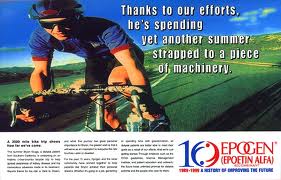And that is ultimately what it is all about. Are we going to have winners decided on the road, during the race or are we going to hand that over to the guys in the lab who do the testing? It seems that the latter is the wave of the future. On Wednesday, Nov 3, infamous bike blogger BikesnobNYC summarized it this way: "Basically, pro cycling has evolved into a game of waiting for blood test results, and at this point you'd probably get more sporting enjoyment out of hanging around your local Quest Diagnostics lab and gambling on what kind of diseases people have."
No matter how you feel about doping or cheating -and the truth is most fans don't care unless someone beats their favorite rider, in which case the offender "must have cheated."- this is not good for the sport of cycling. Somewhat coincidentally the two recent high profile events have involved riders most American fans love to hate. Floyd Landis fell out of favor for attacking America's all time icon Lance Armstrong, while Contador is despised by many for supposedly taking away Lance's eight Tour de France victory.
In another damaging but less high profile example, USA cycling recently awarded National titles for 2007. Once the again the reason was a disqualification of a rider for doping offenses. Awarding a title 3 years after the event, or knowing that your title may be taken away from you in the coming decade, clearly means something is not working. Many serious crimes have a statute of limitations. Apparently not so for the drug offenders.
It is also interesting to note as an aside that the majority of the American prison population consists of minor drug offenders and that much of the prison burden and cost could be alleviated by ignoring minor drug offenses.
Now WADA wants UCI to do night time testing. Here is a case where the measurement itself can influence the results. The riders who are tested at night will pay a price in terms of sleep and recovery. Waking someone in the middle of the night will affect their rest and recovery.
Ironically enough a key driver behind the whole doping hoopla is sponsors. While the fans may not care, the sponsors and their marketing departments clearly do. They do not want to be associated with something that is perceived negatively. I should point out however that perceptions are susceptible to fashion and things that were once acceptable or even encouraged are now seen as cheating. Anquetil, the first five-time Tour de France winner and one who wore the jersey from day one to the finish, had no qualms about publicly admitting to doping.
While the IOC may invoke the "Olympic spirit of fair competition," the Ancient Greeks, inventors of all things Olympic, were ardent believers in special potions and no Greek competitor would have thought of entering the games without some pharmaceutical aid. To counter these facts, the argument is often made that this is immaterial because ancient concoctions did not work, but modern doping does. Laurent Fignon used the same argument recently to justify doping use in the 1980's and 90's.
From a purely pharmaceutical perspective neither argument holds. First, the ancients did discover potent pharmaceuticals and many drugs on the market today are based on such discoveries. Furthermore, there is little scientific evidence that doping works as intended and the issue has not been sufficiently studied. While it is true that steroids, EPO and rHGH have strong physiological effects, it is unclear how much of that translates to victories in competition and victories are what matter here. To give another example, many cancer drugs kill tumor cells, but very few have a life-expectancy benefit- the true measure of success.
 |
| Enhances Fitness! |
Even more ironic is the fact that most sporting companies that sponsor competitions do claim an unfair advantage from using their products. In essence they are claiming that their products work like doping, i.e. that they will make you stronger, faster, more fatigue resistant, let you recover better, and what have you. If any of these claims really held water, their products would quickly end up on the list of banned products.
I suspect it is the withdrawal of sponsorship that really frightens UCI. Unlike other sports that are held in stadiums with spectators paying for seating, cycling is almost totally dependent on sponsorship and TV. That is one reason why doping is much less of an issue in baseball, football or hockey. The owners of stadiums know the fans care very little and they will keep coming no matter what. Tour de France organizers are much more worried about the media. When German TV stations threatened to pull the plug a couple of years ago because "they were not interested in seeing trials of pharmaceutical products," the Amaury Sports Organization quickly responded.
However the reasoning goes, one thing is for sure. Cycling is in a very sorry state of affairs. Someone better fix this sooner than later. Unfortunately I suspect this is one of those areas where technology will not provide a good solution. Let's hope we find out about that before it does irreparable damage to the sport.


No comments:
Post a Comment